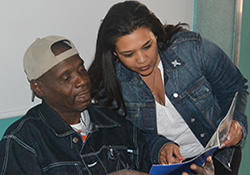Office of Research & Development |
 |

VA Research Currents archive
March 12, 2014

Christina Valenzuela, right, is a peer specialist at the Michael E. DeBakey VA Medical Center in Houston. (Photo by Tammy Schutter)
Recovery from mental illness is often possible. That's the goal of VA's peer specialist mental health program—to have Veterans who have recovered from mental illness serve as role models for other Veterans. The concept is simple: Struggling Veterans will connect better with those who have experienced the same things.
A recent survey conducted by VA researchers in Syracuse, N.Y., and Pittsburgh, along with colleagues at the RAND Corporation, showed the achievements, and difficulties, of hiring Veterans with serious mental illnesses. The findings, published in the Psychiatric Rehabilitation Journal , pointed to widespread success, and some room for improvement.
VA has employed peer specialists for mental health since 2005 and is, in fact, their largest single employer in the world. The program expanded dramatically when President Obama signed an order in 2012 to improve mental health care for Veterans. That led to VA's hiring more than 900 peer specialists nationwide to help treat Veterans with mental illness.
Ninety-two of VA's 138 Local Recovery Coordinators, or LRCs, responded to a 2010 survey asking them about the peer specialist program. The LRCs, who are generally psychologists or social workers, were asked to rate the difficulty and effectiveness of hiring, training, and employing peer specialists and to gauge their impact on care.
Seventy percent of the respondents said peer specialists had been hired at their site. Virtually all were familiar with the program. Over half of the LRCs who worked with peer specialists reported that implementation was going well. The most frequent response on the survey was that the Veterans held the peer specialists in "high regard." They were having a positive impact on care and were of great assistance.
Unfortunately some respondents couldn't define exactly what the peer specialists should be doing. In a few facilities, coordinators felt the peer specialists weren't being used enough.
Another topic that came up was training. Peer specialists currently undergo training, ranging from 40 to 80 hours, just to be certified. Topics include, for example, how to use your story as a recovery tool, and how to listen effectively. Based on the survey responses, the researchers suggested that integrating the LRCs into the training process, and allowing them to tailor the content based on need and location, would further enhance the program's effectiveness and ensure everyone involved understands his or her role.
When it came to care, responses were overwhelmingly positive. Peer specialists were seen as role models, showing it was possible to cope successfully with mental illness, and in some cases, to recover. Wrote the study authors, "PSs were reported to provide hope and an extra resource for Veterans."